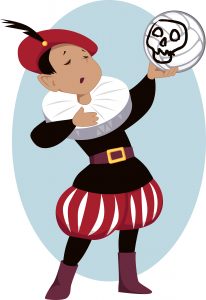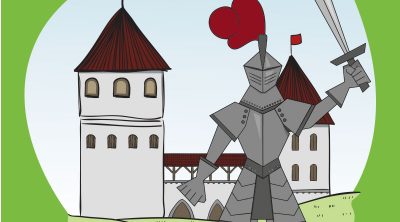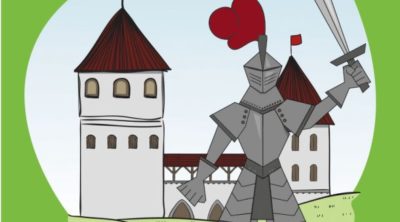How perfect that poet and playwright William Shakespeare’s birthday falls in a month celebrating poetry. After all, he is known for crafting 154 sonnets, some very strictly structured poems, on top of his 37 plays — a bit of poetry themselves, with their wordplay, distinctive meter, and even, on occasion, rhyme.
What’s His Story?
Any study of William Shakespeare, from elementary grades on up, starts best with a bit of biographical information on the bard himself, and The Walking Classroom’s got you covered on this count. Students can listen to Shakespeare (#5-13, Complete-#45) to get some general background on the playwright and his contributions.
The Play’s the Thing
 Students may initially be daunted by the language of an earlier age, but are often pleasantly surprised by the universality of Shakespeare’s works. While the words from way back when may seem somewhat foreign, the experiences and interactions of some of the characters maintain a striking similarity to students’ own! Useful strategies and ideas for the classroom abound. Once your students connect, they’re in!
Students may initially be daunted by the language of an earlier age, but are often pleasantly surprised by the universality of Shakespeare’s works. While the words from way back when may seem somewhat foreign, the experiences and interactions of some of the characters maintain a striking similarity to students’ own! Useful strategies and ideas for the classroom abound. Once your students connect, they’re in!
… and so is Wordplay!
Shakespeare is known for his wordplay. Looking for an especially fun feature of Shakespeare study? Celebrate all of the phrases he coined. William Shakespeare contributed lots of lexicon, as the podcast informs us. Poke further into the marvels of figurative (and musical) language with Alliteration and Personification (#5-67, Complete-#5) and Simile and Metaphor (4-#11, 5-#72, Complete-#4), and experiment with wordplay with your students. Extend the lesson with a video or simile and metaphor jeopardy game for some added lively learning!
How about Those Poems?
In addition to his array of histories, comedies, and tragedies, Shakespeare was known for his sonnets. Your math lovers will especially enjoy the numerical details and patterns abundant in these poems!
Sonnets have fourteen lines, are written in iambic pentameter–with ten syllables per line—and they have a specific rhyme scheme. Want to learn more about rhyme scheme? Have a listen to Rhyme Scheme, Meter, and Verse (#4-9, Complete-#9).
Sonnet Superstars!
Introduce your students to these features in sonnets in a lesson or two. Explore several of Shakespeare’s simpler sonnets, then practice creating a sonnet together as a group, starting with an interesting image. Remind your students that Shakespeare often was inspired by nature (they likely will notice that on their own!). Find a suitable image to get your crew’s creative juices flowing, and follow the guidelines below:
- First, come up with seven words the image evokes.
- Next, develop lists of several words that rhyme with those, knowing you’ll need seven rhyming pairs to generate your Shakespearean rhyme scheme!
- Pick the best seven rhyming pairs.
- Then, craft a line ending with each of those fourteen words. Note: It’s important to keep your rhyme scheme in mind, so that when you put the lines together, they make sense!
- Put your lines together in the order dictated by the rhyme scheme.
- Ta-da! You’ve crafted an original sonnet.
Encourage your students to put their own sonnet-crafting skills into practice, selecting a natural image of their own. It helps to have an array of photos clipped from magazines at the ready (and it’s always good to have w-a-y more than you need!).
That’s Not All!
There are plenty of resources for further exploration and celebration of the bard. From other teachers’ innovative ideas to additional adventures for elementary grades to an array of hands-on activities, you’ll never lack for inspiration.
 Finally, why not add a real celebration to the mix? Have students share their sonnets (and have a bit of cake too!) to celebrate Shakespeare’s birthday on April 23! Learn about other timely topics and be on the lookout for more ideas in future posts.
Finally, why not add a real celebration to the mix? Have students share their sonnets (and have a bit of cake too!) to celebrate Shakespeare’s birthday on April 23! Learn about other timely topics and be on the lookout for more ideas in future posts.






Leave a Reply